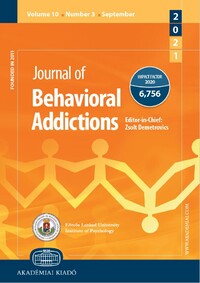Altered connectivity in the right inferior frontal gyrus associated with self-control in adolescents exhibiting problematic smartphone use: A fMRI study
Altered connectivity in the right inferior frontal gyrus associated with self-control in adolescents exhibiting problematic smartphone use: A fMRI study
Author(s): Arom Pyeon, Jihye Choi, Hyun Cho, Jin-Young Kim, Inyoung Choi, Kook-Jin Ahn, Jung-Seok Choi, Ji-Won Chun, Dai-Jin KimSubject(s): Behaviorism
Published by: Akadémiai Kiadó
Keywords: problematic smartphone use; adolescent; functional magnetic resonance imaging; resting-state functional connectivity; inferior frontal gyrus; self-control
Summary/Abstract: Background. With the continued spread of smartphones and development of the internet, the potential negative effects arising from problematic smartphone use (PSU) in adolescents are being reported on an increasing basis. This study aimed to investigate whether altered resting-state functional connectivity (rsFC) is related to the psychological factors underlying PSU in adolescents. Methods. Resting-state functional magnetic resonance images were acquired from 47 adolescents with PSU and 46 healthy control adolescents (the CON group). Seed-based functional connectivity analyses were then performed to compare the two groups with respect to rsFC in the right inferior frontal gyrus, associated with various forms of self-control, and rsFC in the left inferior frontal gyrus. Results. Compared to the CON group, the PSU group exhibited a reduction in rsFC between the right inferior frontal gyrus and limbic areas, including the bilateral parahippocampal gyrus, the left amygdala, and the right hippocampus. In addition, a reduction in fronto-limbic rsFC was associated with the severity of PSU, the degree of self-control, and the amount of time the subjects used their smartphones. Conclusion. Adolescents with PSU exhibited reduced levels of fronto-limbic functional connectivity; this mechanism is involved in salience attribution and self-control, attributes that are critical to the clinical manifestation of substance and behavioral addictions. Our data provide clear evidence for alterations in brain connectivity with respect to self-control in PSU.
Journal: Journal of Behavioral Addictions
- Issue Year: 10/2021
- Issue No: 4
- Page Range: 1048-1060
- Page Count: 13
- Language: English

